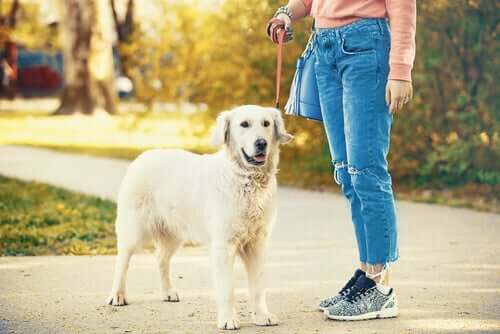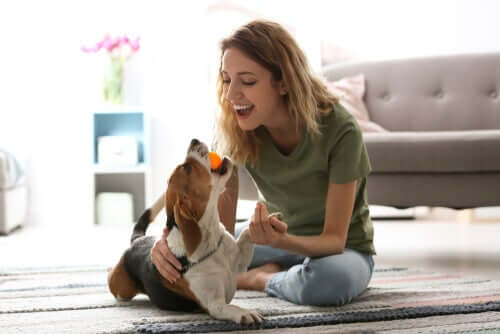Tips for Entertaining Our Pets During the Coronavirus Crisis


Written and verified by the biologist Ana Díaz Maqueda
Long weeks of lockdown are ahead of many of us due to COVID-19 or Coronavirus. This will surely be a tedious time for many people, but also for pets. Especially for those who are used to long walks in the park or the countryside, like dogs. However, not all pets will have such a bad time during the coronavirus crisis.
Pets who are less used to going for a walk, as a result of this situation, will have the company of their owners at home, making them even happier.
Coronavirus or COVID-19 is now considered by the World Health Organization (WHO) as a pandemic. A pandemic is a viral disease that affects the human population worldwide.
The only way to prevent the spread of the virus is to stay at home and avoid contact with other humans. This virus, although it may survive for some time outside, needs a medium to support itself. Therefore, if we avoid coming into contact with each other, we’ll be able to prevent it from spreading.
Walking with pets during the coronavirus crisis
Before we begin offering some tips for entertaining pets during the quarantine, remember that there’s no scientific evidence linking the coronavirus infection through pets. However, it doesn’t hurt to take certain precautions in this matter.
When you take your pet for a walk, you’ll most likely pass through the common areas of your building. Therefore, always remember to wear gloves and avoid touching surfaces as much as you can.
Once on the street, have your dog ready on a 9 ft leash and walk at a slow pace allowing the animal to have some space. There are many things your dog will want to sniff, but under these circumstances, make sure it stays away from other dogs’ urine and feces. Moreover, guide and handle the ride firmly but kindly, so that your pet doesn’t get frustrated and starts pulling the leash.

During the walk, keep in mind that in some countries only one person should go with the dog. Don’t forget to collect their waste with a clean plastic bag and dilute the urine with vinegar and water whenever possible. In addition, don’t release the dog under any circumstances. The streets aren’t a suitable place for this right now, and, on top of this, you may get yourself a fine.
When you return home from the walk, discard the gloves, wash your hands thoroughly with soap and water, and make sure you disinfect your pet’s feet. This is very important.
How to play with your pet at home during a state of alarm?
In a normal situation, when we can go out freely and when there are no restrictions, we should also play with our pets at home. Practicing calmness and fostering the pet-owner bond is important no matter the situation.
Smell training for pets during the coronavirus crisis
Smelling games are fundamental for your dog’s mental well-being. This type of game fosters the link between tutor and pup, encourages canine self-control, frustration management, self-safety, and self-esteem.
One of the easiest games is to create a maze inside the house. Place obstacles such as chairs, tables, boxes, cushions, and toys. Then strategically place pieces of appetizing food for your dog and tell them to look for them. At first, they may not understand very well what they have to do. So, encourage them to keep going and show them where the prizes are.
On the other hand, if your dog is already somewhat trained in this type of game, you can hide their toys or food around the house instead. As a result, after giving them the “search” command you’ll manage to keep them well entertained for a while.
Take advantage of mealtimes to play for a while. Try not to offer them all the food together in one bowl. For example, inside a box, place rags and old clothes, newspapers, magazines, etc. Hide the food pieces among the objects. This will force the pup to use its sense of smell to find out where its food is. If you take the dog out right after this exercise, you’ll notice that, on the street, it’ll be much more relaxed.
These types of games are the ones that tire a dog the most, even more than going for a run, playing ball or interacting with other dogs. In addition, since tiredness is mental and not physical, you’ll help the dog reduce its stress levels. This will also help to improve their mood.
Contact games

Because you won’t be able to go out for a walk on the street much, an alternative is to play contact games. Get down on the ground with them and mess around. Let them lick you and bite you softly as they would do with other dogs. However, if you feel that your dog isn’t controlling their strength while playing, go ahead and try some other kind of game.
You could have them bite a rope toy and play by pulling it away from them. You know they love it!
Working on calmness and tranquility
If you normally allow your dog to get on the bed or couch, invite them up and lay down with them for a while. Stroke your dog and simply enjoy their company. You can also do the same on the ground.
The point is to learn how to spend some quality time with our beloved furry friends and further strengthen the bond we have with them. This is especially important during the coronavirus crisis and uncertainty. We hope you stay safe and take good care of yourself and all your loved ones. Till next time!
Long weeks of lockdown are ahead of many of us due to COVID-19 or Coronavirus. This will surely be a tedious time for many people, but also for pets. Especially for those who are used to long walks in the park or the countryside, like dogs. However, not all pets will have such a bad time during the coronavirus crisis.
Pets who are less used to going for a walk, as a result of this situation, will have the company of their owners at home, making them even happier.
Coronavirus or COVID-19 is now considered by the World Health Organization (WHO) as a pandemic. A pandemic is a viral disease that affects the human population worldwide.
The only way to prevent the spread of the virus is to stay at home and avoid contact with other humans. This virus, although it may survive for some time outside, needs a medium to support itself. Therefore, if we avoid coming into contact with each other, we’ll be able to prevent it from spreading.
Walking with pets during the coronavirus crisis
Before we begin offering some tips for entertaining pets during the quarantine, remember that there’s no scientific evidence linking the coronavirus infection through pets. However, it doesn’t hurt to take certain precautions in this matter.
When you take your pet for a walk, you’ll most likely pass through the common areas of your building. Therefore, always remember to wear gloves and avoid touching surfaces as much as you can.
Once on the street, have your dog ready on a 9 ft leash and walk at a slow pace allowing the animal to have some space. There are many things your dog will want to sniff, but under these circumstances, make sure it stays away from other dogs’ urine and feces. Moreover, guide and handle the ride firmly but kindly, so that your pet doesn’t get frustrated and starts pulling the leash.

During the walk, keep in mind that in some countries only one person should go with the dog. Don’t forget to collect their waste with a clean plastic bag and dilute the urine with vinegar and water whenever possible. In addition, don’t release the dog under any circumstances. The streets aren’t a suitable place for this right now, and, on top of this, you may get yourself a fine.
When you return home from the walk, discard the gloves, wash your hands thoroughly with soap and water, and make sure you disinfect your pet’s feet. This is very important.
How to play with your pet at home during a state of alarm?
In a normal situation, when we can go out freely and when there are no restrictions, we should also play with our pets at home. Practicing calmness and fostering the pet-owner bond is important no matter the situation.
Smell training for pets during the coronavirus crisis
Smelling games are fundamental for your dog’s mental well-being. This type of game fosters the link between tutor and pup, encourages canine self-control, frustration management, self-safety, and self-esteem.
One of the easiest games is to create a maze inside the house. Place obstacles such as chairs, tables, boxes, cushions, and toys. Then strategically place pieces of appetizing food for your dog and tell them to look for them. At first, they may not understand very well what they have to do. So, encourage them to keep going and show them where the prizes are.
On the other hand, if your dog is already somewhat trained in this type of game, you can hide their toys or food around the house instead. As a result, after giving them the “search” command you’ll manage to keep them well entertained for a while.
Take advantage of mealtimes to play for a while. Try not to offer them all the food together in one bowl. For example, inside a box, place rags and old clothes, newspapers, magazines, etc. Hide the food pieces among the objects. This will force the pup to use its sense of smell to find out where its food is. If you take the dog out right after this exercise, you’ll notice that, on the street, it’ll be much more relaxed.
These types of games are the ones that tire a dog the most, even more than going for a run, playing ball or interacting with other dogs. In addition, since tiredness is mental and not physical, you’ll help the dog reduce its stress levels. This will also help to improve their mood.
Contact games

Because you won’t be able to go out for a walk on the street much, an alternative is to play contact games. Get down on the ground with them and mess around. Let them lick you and bite you softly as they would do with other dogs. However, if you feel that your dog isn’t controlling their strength while playing, go ahead and try some other kind of game.
You could have them bite a rope toy and play by pulling it away from them. You know they love it!
Working on calmness and tranquility
If you normally allow your dog to get on the bed or couch, invite them up and lay down with them for a while. Stroke your dog and simply enjoy their company. You can also do the same on the ground.
The point is to learn how to spend some quality time with our beloved furry friends and further strengthen the bond we have with them. This is especially important during the coronavirus crisis and uncertainty. We hope you stay safe and take good care of yourself and all your loved ones. Till next time!
All cited sources were thoroughly reviewed by our team to ensure their quality, reliability, currency, and validity. The bibliography of this article was considered reliable and of academic or scientific accuracy.
- Tan, J., & Tan, A. D. J. In early January 2020, the World Health Organisation identified a new strain of virus sweeping across China, known as 2019 novel coronavirus (COVID-19). Here, I explain what you need to know about coronavirus.
This text is provided for informational purposes only and does not replace consultation with a professional. If in doubt, consult your specialist.








